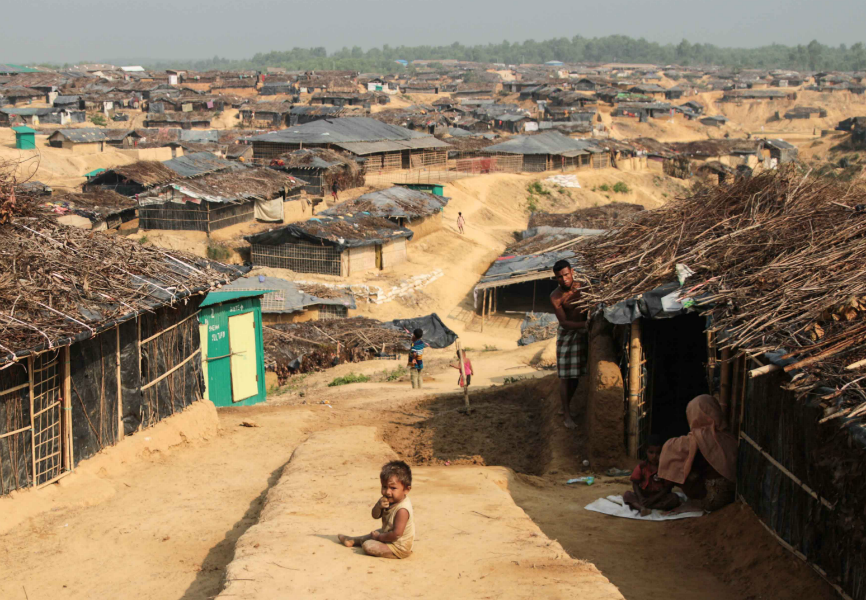It has been three months since Rohingya Muslims began fleeing Myanmar and with Pope Francis' three-day visit to Myanmar, the Rohingya crisis continues to be a headline. The US, UK, and UN have all called the crisis “ethnic cleansing” and
over 620,000 Rohingya Muslims have fled from Myanmar after a military crackdown in August. Myanmar's de factor leader Aung San Suu Kyi has faced increasing criticism from the international community, but denies all wrongdoing, despite UN Secretary-General Antonio Guterres calling the situation a “humanitarian and human rights nightmare.”
Following his
earlier analysis, Eurasia Group's Southeast Asia expert
Peter Mumford discusses the continuing crisis in the Rakhine State, where
more than half a million people have fled since the violence started.
Pope Francis' visit to Myanmar has been met with a fair amount of trepidation, with Cardinal Charles Maung Bo, archbishop of Yangon, advising Pope Francis to not use the word 'Rohingya' as the “word is very much contested and not acceptable by the military, nor the government, nor the people in Myanmar.” What are the political implications of Pope Francis' trip to Myanmar and subsequent visit to Bangladesh to visit Rohingya refugees?
Pope Francis' trip has further raised international attention on the plight of the Rohingya and internal ethnic/religious conflict in Myanmar. His visit to Myanmar and Bangladesh is aimed at encouraging both countries to fulfill their agreement to allow the safe return of refugees to Myanmar. But it is unlikely to significantly change what happens on the ground.
His avoidance of the term 'Rohingya' means he side-stepped possible diplomatic rupture with the Myanmar government and the risk of increasing tensions between the majority Buddhist population and the country's minority (one percent) Christian population.
International human rights groups have accused Pope Francis of toeing the Myanmar government's line and missing the opportunity to pressure the government to take more decisive action to help the Rohingya. His failure to use the term 'Rohingya' and take a tougher stance in Myanmar will do little to improve Christian-Muslim relations in the region. Hardline Islamic groups in Indonesia and elsewhere are already using the plight of Rohingya, and what they see as the international community's failure to act, as a rallying call.
Beyond the religious and ethnic differences considered to be the main cause of the persecution, are there any political motivations behind the crisis, including land grabbing for development projects, or the construction of infrastructure and pipelines in the region?
Inevitably there are likely to be many factors involved.
Some have suggested that strategic interests, in particular the oil pipeline traversing parts of Rakhine state, are the true underlying cause. But these are likely not the main drivers. The fate of the Rohingya has long been a divisive issue in Myanmar, before the pipeline was even planned. Movements of the Rohingya within the state have been constrained, so unlikely to impact infrastructure development projects.
The conflict is one of many ethnic and religious tensions in Myanmar, but by far the most severe. The hate and dislike felt toward the Rohingya by the majority Buddhist and ethnically Burmese population is extreme and unimaginable to most people.
The exodus of Rohingya from Myanmar has occurred over decades,
but the spiral of violence has spiked in recent years, and ratcheted up further since late 2016. This coincided with tit-for-tat violence on police and military checkpoints by the insurgency group Arakan Rohingya Salvation Army (ARSA), whose ranks have grown over the last year. These attacks were met with an overwhelming and disproportionate military response by the Myanmar army. The murder of several Buddhists in the Mayu mountains in August, which ARSA was accused of carrying out and the first in which civilians were the victims, was the key inflection point. The incident sparked a massive military response that saw hundreds of thousands of Rohingya flee the country and villages burnt to the ground.
For the military, who are eager to retain an influential role in politics and society following the transition to democracy, the Rohingya situation has improved their public standing. Many in Myanmar have been suspicious of the military, but the country's multitude of disparate (non-Muslim) ethnic groups share a common hatred of the Rohingya and largely approve of the military's actions against them.
Myanmar's de facto leader Aung San Suu Kyi says the country is ready to welcome back 'verified' refugees who have fled Myanmar, but the government has long refused to grant the Rohingya citizenship, and as a result most Rohingya Muslims have no legal documentation, making them stateless. How will this impact Rohingya refugees who wish to return to Myanmar? Will any return to the region? Is this a deliberate action on the government's part to prevent refugees from returning?
The deal struck between Bangladesh and Myanmar was very much on the latter's terms. The lack of formal UN involvement in the deal has further added to concerns, with critics arguing the issue should have been internationalized, rather than left as purely bilateral agreement (though it refers to role for the UN).
The number of Rohingya who return to Myanmar in the future will be constrained by the requirement for residency documentation (which many will have lost while fleeing or never had in the first place) and fears over their safety once they return, especially absent a more robust international presence to protect them. The deal also only applies to those who fled Myanmar after October 2016.
The Myanmar-Bangladesh deal does nothing to address the underlying issue with the Rohingya –
religious/ethnic persecution and lack of citizen rights. It is hard to see this being resolved anytime soon given that rife Buddhist nationalism and an inability to control the army leave Aung San Suu Kyi few political options. Arguably, she has not only taken insufficient action to help the refugees, but has further inflamed the situation by refusing to use the term 'Rohingya' and by blaming ARSA for the Buddhist civilians' deaths in the Mayu mountains before any investigation had taken place.
US Secretary of State Rex Tillerson declared that the situation in northern Rakhine state “constitutes ethnic cleansing against the Rohingya,” which follows similar statements by the United Kingdom and United Nations. Can we expect to see US sanctions against Myanmar reinstated? What steps – if any – can we expect other states or the ASEAN organization to take to alleviate the crisis?
Re-instatement of broad-based sanctions on Myanmar, whether by the US or other powers, is unlikely as this would only undermine Aung San Suu Kyi's government and strengthen the hand of the military, pushing the country backwards. Concerted diplomatic pressure is more likely in the hopes of encouraging the Myanmar government to fulfill its commitment to allow the Rohingya to return and to ensure their safety. US pressure has been late coming, with the Trump administration slow to respond.
Failure by Myanmar to allow the Rohingya to safely return in very large numbers could lead to small-scale targeted sanctions against military leaders, but not the entire country. The impact of such a move would likely be limited and largely symbolic. There could be growing public pressure on Western companies not to engage with the Myanmar government, causing some to reevaluate the potential reputational risks of doing business in the country; this is less likely in Asian countries.
China and Russia would likely block any attempts by the UN Security Council to ratchet up the pressure on Myanmar.
ASEAN is unlikely to take any significant action on this as they don't like to interfere in what they see as domestic issues of other member states, and at present the Rohingya situation (unlike the refugee boat crisis of 2015) doesn't directly impact any other member states in the bloc.
As head of Eurasia Group's Southeast Asia coverage, Peter Mumford helps clients navigate this dynamic region that offers enormous opportunities but is very diverse and requires a detailed understanding of complex, changing political and regulatory systems to ensure success. He is based in the Singapore office.

 Thousands of Rohingya flocked to Kutapalong Camp after crossing from Myanmar into Bangladesh. (J. Owens/VOA)
Thousands of Rohingya flocked to Kutapalong Camp after crossing from Myanmar into Bangladesh. (J. Owens/VOA)
